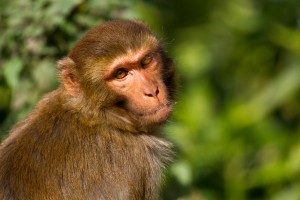 A recent study, published on Dec. 23 in the journal Nature Neuroscience, discovers brain cells that fire when monkeys act unselfishly! In the study, rhesus monkeys were monitored during interactions involving the giving away and acceptance of juice from other monkeys. The scientists observed that certain brain cells were triggered when the monkeys gave away juice, but were not triggered when the monkeys received juice.
A recent study, published on Dec. 23 in the journal Nature Neuroscience, discovers brain cells that fire when monkeys act unselfishly! In the study, rhesus monkeys were monitored during interactions involving the giving away and acceptance of juice from other monkeys. The scientists observed that certain brain cells were triggered when the monkeys gave away juice, but were not triggered when the monkeys received juice.
Max Rushworth, a neuroscientist at Oxford University wrote in an email: “The new findings provide a ‘complete picture of the neuronal activity underlying a key aspect of social cognition,’…’It is definitely a major achievement.'”
Scientists in the field refer to these observations as the “do-gooder impulse.” Study co-author Michael Platt, a neuroscientist at Duke University, beleives that this primitive do-gooder impulse has evolved into that altruism we see in humans today.
Here is how that study was actually carried out. Platt and his fellow scientists taught the rhesus monkeys to play a computer game in which they looked at different shapes which either meant to give themselves, another monkey, or nobody a squirt of juice. As expected, the monkeys gave themselves the juice whenever they had the option. Then the researchers set up another trial, except this time the monkeys only had the option to either give juice away, or give no juice at all. In this trial, the monkeys consistently preferred giving away their juice over giving nothing at all.
When looking at the monkeys brain map, Platt and his colleagues saw that the neurons in the region called the anterior cingulate gyrus were being fired. That same region has been observed in other social interactions, such as when a person watches his or her romantic partner being pinched. The results suggest that that area of the brain may be responsible for creating empathy.
Platt speculates that this region maybe responsible for what is known as altruism in the human brain.
I find it fascinating how scientist are able to trace the sources of even the most highly regarded human traits. What do you guys think? What type of implication can such a discovery produce?


hannahbanana
Wow this is a very interesting article! I never knew traits like altruism could trigger reactions in the brain. I wonder if this is something innate in humans. As we have seen for humans, some are more satisfied than others through service. Cool!
To learn more about emotions and the brain check out this article..
http://www.medicalnewstoday.com/releases/52415.php
explodingllama342
I think this is a great discovery. Personally, I’m of the mindset that humans need to stop thinking that they are so special. We’re basically just really intelligent animals, and I think this discovery is a very much needed slice of humble pie, although I think this gene may have skipped me 🙂
This is a list of the 10 smartest animals. I think that it’s interesting all the different ways we can measure intelligence. Its seems that this will never be truly agreed upon, whether in animals or humans.
http://www.msnbc.msn.com/id/24628983/ns/technology_and_science-science/t/smartest-animals/
sayrest4
This is very interesting! It has also been found that bees exhibit altruistic behavior as well. Worker Bees often sacrifice themselves for the Queen Bee. This can be seen when they sting something, often killing them.
http://www.nimh.nih.gov/media/video/robinson.shtml
http://www.animalethics.org.uk/altruism.html